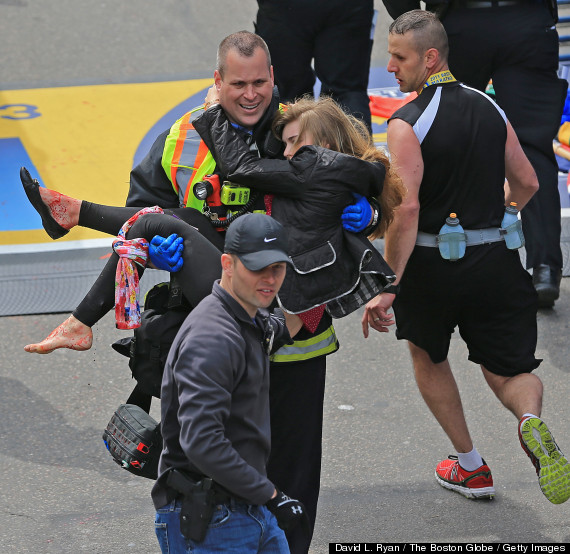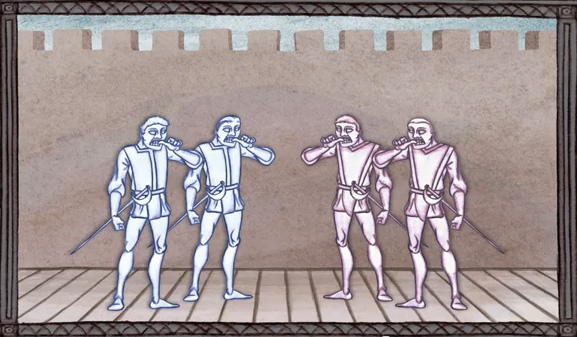Acts 9:36-43
Psalm 23
Revelation 7:9-17
John 10:22-30
Thursday night, or Friday morning,
depending on how you look at it, I was awakened by the telephone. I had been fast asleep and for a disoriented
moment I thought it was the alarm. I
didn’t get to the phone in time to answer it, and when I did I saw that it was
2:18 A.M. I was hoping someone had
misdialed but then I saw that I had a new voice message. So I called the voicemail number and entered
my password, with a sense of dread about what that message was going to say.
Well, it turned out that the news
wasn’t that bad. A young woman named
Samantha, taking her ailing mother home to Oregon from Southern California, had
spent all her money on car repairs and couldn’t go any further that night. She said her mother was an Episcopalian and
they had called St. John’s and gotten my number from the recorded greeting. They had looked all over town for a vacant
motel room and had finally found one, and they wanted to know if I could pay
for it. Some of you may not know this,
but the members of St. John’s provide a Discretionary Fund for me to use to
assist people in need, so I called her back, and agreed to meet her at a motel
next to the freeway at the north end of town.
I’d been reading the gospel lesson
for today before I went to bed that night, and as I drove up the on-ramp I
thought of what Jesus says about his sheep, and how they hear his voice, and follow
him. And it struck me that this is what
that looks like. There are a lot of
reasons why we have an institution called St. John’s Episcopal Church, with an
office and a telephone and an answering machine. There are a lot of reasons why we have a pastor,
and a discretionary fund. But one of the
reasons is surely so that when somebody is out on the road in the middle of the
night far from home, they can know the presence of the Good Shepherd in a
concrete, tangible way.
And maybe it was just because it
was the middle of the night and my mind wasn’t functioning normally, but I felt
joyful in that moment and grateful for the privilege of being the one to
represent you like that. Not because I
was standing in for Jesus, but because I was one of his sheep. When that call came at 2:18 in the morning it
was the Good Shepherd on the other end of the line. And I was the one chosen, in that moment, to hear
his voice and to follow him.
Jesus talks about a relationship in
which the Shepherd is just as vulnerable as the sheep. The sheep hear the voice of the Shepherd and
they respond to it with trust and obedience.
But the Shepherd also lives by trust and obedience in relation to the
one he calls Father. And that is what
makes the Shepherd trustworthy and good.
That is why the sheep listen to his voice and follow him, even when it
means waking up at 2:18 in the morning.
That is why they follow his voice even when it means rushing toward the site of a bombing, when there
has been a second bomb, and might be third.
That is why they follow his voice even into a burning fertilizer factory
filled with ammonia.
The Good Shepherd shows the sheep
the goodness of the Father, whose mind no one knows, and whose face no one can
see. And sometimes that doesn’t feel
like enough. Sometimes we are like those
who surround Jesus in the temple and ask, “How long will you keep us in
suspense? Tell us now!” Sometimes we
don’t want to live in vulnerability.
Sometimes we don’t want a relationship of trust and obedience. Sometimes we get tired of listening and
following. We want the complete picture,
to have the last word, so we can be in control from here on out, so we can be
our own shepherds.
But that urgent demand to have
everything settled, that unwillingness to wait any longer for one’s own truth
to be vindicated, is what leads to political violence. When people start to say things like, “The
time for talk is past. We don’t want to
hear the other side of the issue,” and “We can’t wait any longer, and will do
whatever it takes to get our point across,” then watch out, because you know
what’s coming—the missiles are about to fly; the death squads are putting on
their hoods; the torturers are getting out their tools; someone is packing
nails and ball-bearings into a pressure-cooker.
But when people are willing to kill innocents,
it’s because the cause they are fighting for is already marked for death. Even if it is a power that stands astride the
world, if you know where to look, you can already see the cracks in the
foundation. If you listen closely you
can hear the wailing of the mourners, and catch the faint whiff of decay. The setting of today’s gospel story is the
Jerusalem temple, at the annual feast of the Dedication of the temple
itself. The temple was the cornerstone
of political and economic, as well as religious, order in the Palestine of
Jesus’ day. And as near as we can tell,
challenging the legitimacy of the temple was Jesus’ capital crime. His enemies had him killed in order to
protect the temple. But by the time the
Gospel of John was written, the temple was a blackened pile of fallen stones.
The truth that is so urgent that
people are willing to kill for it is a hollow truth. It bears the mark of death on its heart. But the Good Shepherd speaks with a different
kind of urgency, the urgent love of life.
It is the urgency of Peter rushing off to Joppa to pray for the life of
the widow Tabitha. It doesn’t need to
know the final answer, or to force events to a final crisis. It only seeks to hear the trusted voice, the
one that knows who we are, telling us what to do next. Even amidst the pressing demands of the
moment, the sheep of the Good Shepherd walks in peace. It is the peace of knowing that it is enough
to hear his voice and to follow, because the Good Shepherd is one with the
Father, who is the indestructible Lord of Life.
Sometimes we might wish the voice
had led us on a different path. There
are times when our pasture doesn’t feel particularly important, or glamorous or
rewarding. Maybe it’s kind of scrubby,
and a little dry. Maybe we have to walk
a long way to get to the place where the cool water flows. Maybe the howls of the wolves at night sound a
little too close for comfort. But if we
learn to listen for the voice of the shepherd, I think we’ll discover that even
our sheepish lives have about them a certain kind of urgency.
We may not be called to help the
victims of a terrorist bombing, but the world is not short of victims. We may not be sent to apprehend a pair of
armed and dangerous fugitives, but there are angry people everywhere. We may not be summoned to raise someone from
the dead, but there are people all around us who need a prayer and a touch and
an invitation to rise. And none of the
people who did those heroic things thought they would have to do them until the
moment came and the voice spoke that said “follow.”
And they did follow, and in some
cases in cost them everything. But if we
were to say they were mistaken, we would be drawing the wrong conclusion. Because in a world marked for death only one
thing is certain. Only one thing is
guaranteed. It is that God knows us and
loves us and holds us in the hand of indestructible life. That is all the Good Shepherd needed to
know. He placed himself completely in
the power of that hand, and it led him to lay down his life for his friends. But it also gave him the power to take it up
again, a power that he gives to us moment by moment, day by day. Do you hear his voice?


